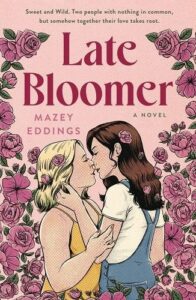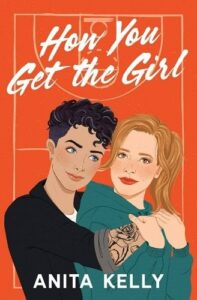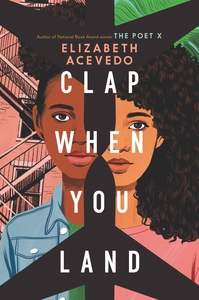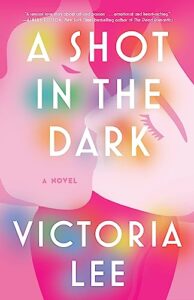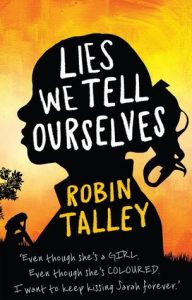Buy this from Bookshop.org to support local bookstores and the Lesbrary!
After winning the lottery, Opal Devlin puts all her money in a failing flower farm, only to find an angry (albeit gorgeous) Pepper Boden already living there. Though she’s unable to find her grandmother’s will, Pepper claims she’s the rightful owner of Thistle and Bloom Farms. While they agree to cohabitate, Opal and Pepper clash at every turn. Can something softer blossom between these polar opposites, allowing a new dream to take root and grow?
Oh. My. (Sappho.) Goddess. You may think you know Mazey Eddings’ writing style, but I assure you, you do not. Many of us read The Plus One and/or Tily in Technicolor last year, but Eddings has far exceeded herself with this one. As a neurodivergent author, Eddings’ stories often have some element of neurodiversity/mental health, shining a light on the different ways people’s brains work while embracing those differences through beautiful, realistic characters. Opal and Pepper are no different, both on the spectrum yet unique in their behaviors and view of the world. These women are not predictable, pre-programmed components of a story; they are ever-blooming, learning how to plant roots alongside one another, share sunlight, and rise despite being different species. Both plants, growing and adapting to different elements, yet very much the same. While Opal and Pepper have always struggled to fit in with the world around them, they manage to cultivate a safe, healthy garden for one another.
This is one of those overwhelming, layered, awe-inspiring sapphic stories that will tug at your heartstrings long after you read it. Eddings’ language leaps off the page, making it a little reminiscent of One Last Stop (be still, my little sapphic heart). I’ve beyond annotated Late Bloomer, when I’m usually selective about choosing quotes. You don’t just see love blossom between these two women; you feel it. It made me smile, laugh, get all messy and misty-eyed. As I said, neither woman is predictable. Opal feels directionless at the story’s start, allowing her (fake) best friend and (on/off) ex to step all over her. I expected her to be the wallflower, especially with the BITE we see from Pepper (pun unintended) in her first chapter, but the two balance each other out. When Pepper feels uncertain or anxious, Opal steps forward, bold and unwavering. When Opal begins to crumble, Pepper holds her up. They support each other, never allowing the other to wilt.
Unfortunately, this book relies heavily on miscommunication. Both women are eager to hide their real feelings at the risk of scaring the other. That lack of communication continues until almost the last chapter.
Recommended for fans of One Last Stop and Imogen, Obviously. Side note: please, please read the author’s note. Good goddess.
✨ The Vibes ✨
❀ Neurodivergency/Autism Spectrum
❀ Sapphic Romance
❀ Grief/Healing
❀ Forced Proximity
❀ Spicy/First Time
❀ Cottagecore Vibes
❀ One Bed
❀ Touch Her and You Die
❀ Dual POV
❀ Miscommunication
❀ Flower Competition
❀ Grumpy/Sunshine
Quotes
❝Slowly, she leans toward me, and my heart pounds so violently in my chest that my head swims. Is she . . . It almost seems like she’s going to press that smile to my mouth. Teach me how it tastes.❞
❝Ah. There’s the you I missed.❞
❝I used to stress over finding a label that fit me. Lesbian. Bisexual. Pan. Demi . . . I’ve filtered through them all many times over, none ever feeling quite right. Just say queer and move on with your life, Diksha finally told me late one night after what was probably my sixth sexual identity crisis of my early twenties. But what does that mean? I’d wailed, draining more boxed wine into my plastic cup. My brain loves order and labels and concise frameworks to understand things, and not knowing where I fit feels unbearable. It means you’re you, and only you get to decide who you like and when you like them, Tal had said from their chair in the corner. The name of your feelings isn’t anyone’s business but yours.❞
❝But instead, she reaches out to me—opening her hand like a flower unfurling its petals to the sun. I stare at it. The ink stains and calluses and chipped nails and bitten cuticles. For a moment, that hand looks like a second chance.❞
❝Her poems spoke softly—as intimately as confessions between lovers—about the terrible, wonderful ache of being in love.❞

